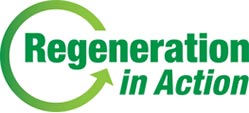Zero Waste Zones – Accomplished
During her tenure as the Green Foodservice Alliance Executive Director, Ei Founder Holly Elmore brought a vision into grounded action through the Zero Waste Zones (ZWZ) program. In January 2010, the ZWZ transferred stewardship to Ei as the program continued to gain momentum in its national leadership role.
In September 2012, the National Restaurant Association (NRA) validated the program importance via their ZWZ acquisition.
Below is the history leading up to the ZWZ purchase by the trade association for the nation’s second largest private-sector industry:
In the beginning …
In February 2009, the ZWZ launched in Atlanta, Georgia at a press conference lead by Stanley Meiburg, Acting Regional Director of the U.S. Environmental Protection Agency, Region IV. With impressive media response, Atlanta received national recognition as a pioneer city in sustainability. The Media Page details press listings, including a CNN story and New York Times front-page article.
The story begins in the summer of 2008 when Atlanta lost a convention to another city as the client perceived the other city “greener.” A convention-driven city, Atlanta was ready to embrace “green practices” in the downtown convention district where businesses pledged to implement zero-waste initiatives. Working in collaboration with Atlanta Recycles, the Georgia Recycling Coalition, the Sustainability Division of the Georgia Department of Natural Resources and the U.S. Environmental Protection Agency, the ZWZ Criteria was developed, participants recruited, and the ZWZ-Downtown Atlanta launched.
What were the Zero Waste Zones?
The formal definition: a collective gathering of community working together on changing current disposal methods of consumed products.
A zone was a defined geographic area or a foodservice category with unique characteristics impacting ZWZ Criteria. Territory zones partnered with a local business association and mirrored the association’s district; territory zones created route density for ZWZ suppliers. A category zone example was Off-Premises Caterers where food is transported to an off-site location.
The foodservice industry, the second largest private sector industry, served as a catalyst for change in standard corporate operating practices. Government, non-profit, trade association and private enterprise stakeholders developed an ACTION plan that made good business sense for the entire value chain, including the community and the environment.
The ZWZ goal was to divert the maximum amount of recyclable items and organic matter from landfills and back into the production cycle.
ZWZ Criteria:
ZWZ Participants pledged to implement and maintain the following criteria:
- Spent grease collection for the production of bio-fuel.
- Common recyclables (cardboard, paper, glass, plastic and metals) collection for recycling.
- Excess food donation in accordance with the Good Samaritan Food Donation Act.
- Food residuals from preparation | service and excess food not compliant with the Food Donation Act collection for composting or other state-permitted destinations.
The Journey:
To learn about the ZWZ journey, visit the Zero in ACTION Blog articles featured above to the left and the Milestones page for a recap of the milestone events, players and ACTION that moved a vision into reality.
ZWZ Media:
The ZWZ program was popular with the media! The following pages detail the impressive media and press information:

